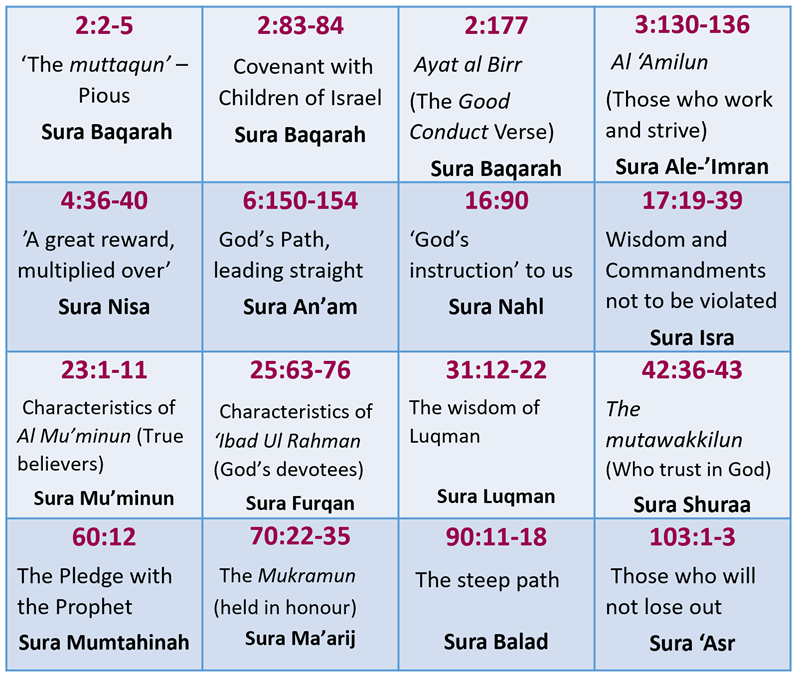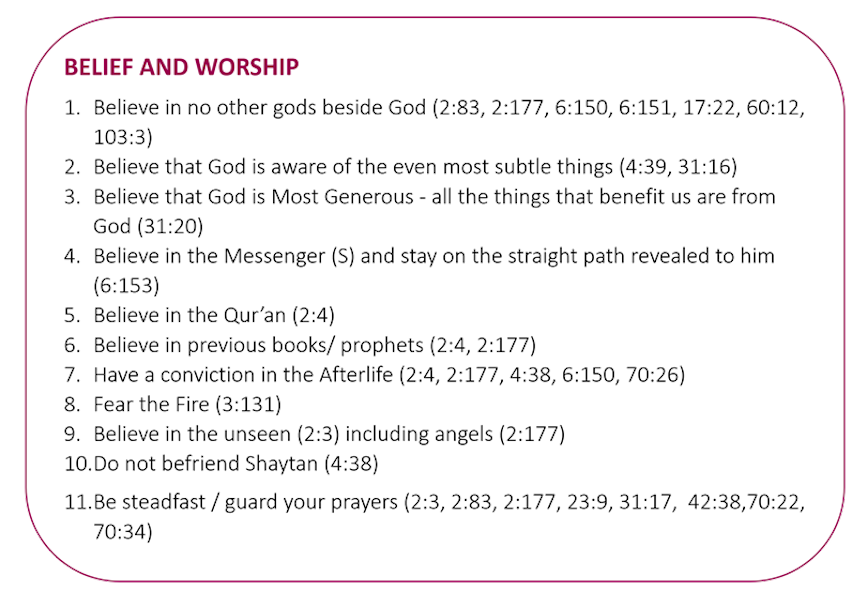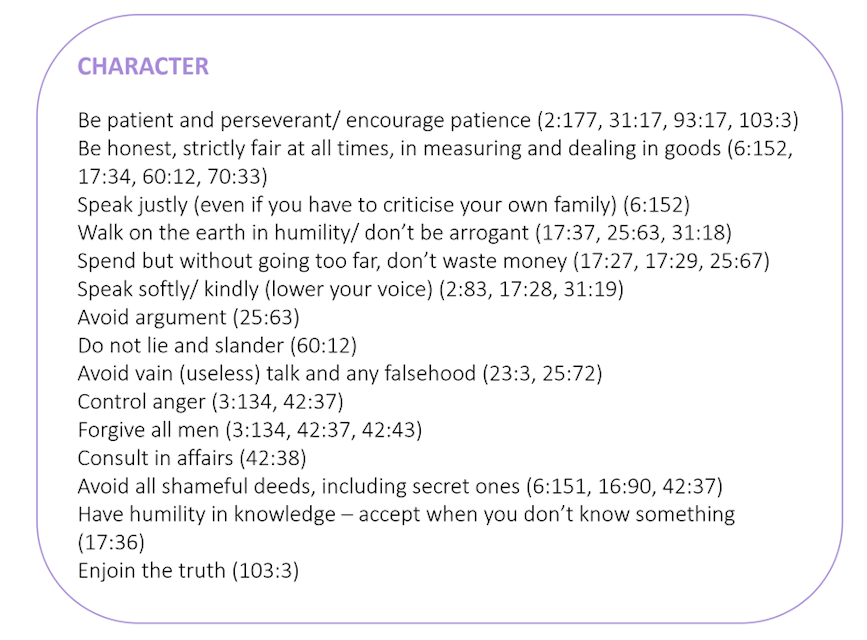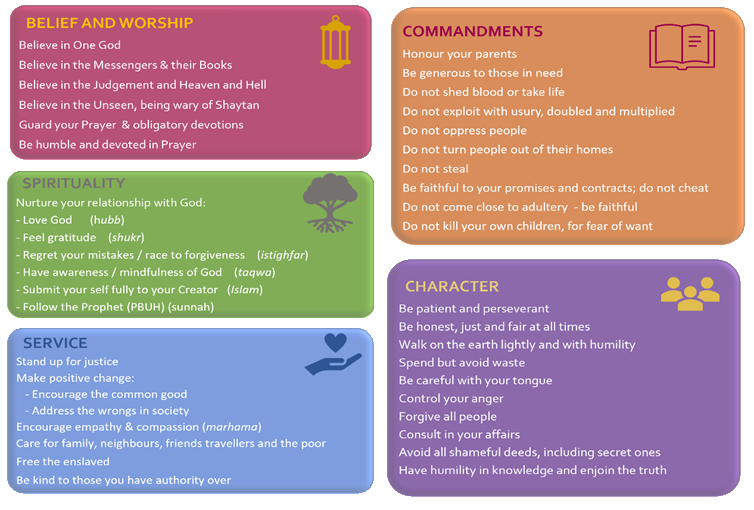Contents
Scenario: Presenting Islam – with the five pillars?
Imagine a scenario where you’re asked to do a short presentation on the basics of Islam, whether in an RE lesson at school, at work or to an interfaith group.
How often do you see people reaching for the five pillars in such situations?
Yet we know that the ‘five pillars’ are simply the ritual worship that supports the foundations of the religion, so you might say, they ‘hold up’ Islam.
“The Prophet (PBUH) said, ‘Islam has been built on five [pillars]: testifying that there is no deity but Allah and that Muhammad is the Messenger of Allah, performing the prayers, paying the Zakah, making the pilgrimage to the House, and fasting in Ramadan.'”
(Bukhari and Muslim)
However, despite their importance, the five pillars alone do not provide any full sense of the wondrous edifice that is Islam. There are many beautiful mosques and they are held up by pillars. If you were asked to spend 30 minutes describing the Blue Mosque in Istanbul, for instance, despite its elephantine pillars, you would not spend too much time dwelling on them!
It should come as no surprise that we do not find the Prophet (PBUH) ever introducing people to the beauty of Islam using the five pillars.
For instance, we clearly see this when he advised some companions as they were leaving on a mission to educate the people of Yemen about the faith. He advised gradation, focusing on the most important teachings first, rather than laying it all down at once:
–
“Verily, you are coming to some of the people of the Book, so call them to testify there is no deity but God and I am the Messenger of God.
–
If they accept that, then teach them that God has obligated five prayers in each day and night.
–
If they accept that, then teach them that God has obligated charity to be taken from the rich and given to the poor.
–
If they accept that, beware not to take from the best of their wealth. Be on guard from the supplication of the oppressed, for there is no barrier between it and God.”
(Bukhari and Muslim)
Turning to achievements?
The religion of Islam begat a splendid and rich civilisation, which brought together peoples from every corner of the globe and synthesised from their learnings and arts something altogether unique and dazzling.
Mihrab Cordoba Mesquita
(Wikimedia Commons)
Indeed, Islamic Civilisation was renowned for:
- Arts
- Architecture
- Science
- Inventions
- Medicine and hospitals
- Embrace of learning, universities
- Learning from all civilisations
- Synthesising knowledge and cultures
- Tolerance
- Hospitality
- Charity – awqaf
But if we were to showcase Islamic civilisation, we’d have to also accept that it emerged from a plethora of local cultures over time and place, resulting in some not so positive elements as well, e.g.
- Treating non-Muslim minorities unequally
- Extremely unequal treatment of women – cloistering them
- Slavery
- Monarchies
- Constantly warring frontiers and instability, encouraged by jihad
- Sexual licentiousness, prevalence of alcohol (!)
Turning to the Law?
If not the five pillars, should we describe Islam through the shari’ah? Like civilisation, Islamic Law evolved over the centuries and became increasingly sophisticated at solving people’s problems and maintaining justice and order.
To some extent though, the Law encounters problems similar to Islamic Civilisation. Because Islamic law respected indigenous customs, some norms became encoded in law, which were accepted at the time but make little sense in our very changed world today.
Examples include, fighting offensive wars, treating non-Muslims and women unequally, ratifying slavery, ratifying monarchies, etc.
Let’s not also forget that the Law usually steps in when there are problems. So, there is an ethical code which should guide and govern people long before the Law is resorted to.
People can be really quite terrible but still stay within the law.
Turning to the hadith?
How about turning to the hadith for this ethical code – for the teachings to be practiced by all Muslims in their day to day lives?
Indeed, the Prophet (S) was the embodiment of guidance. The Qur’an informs us:
لَقَدْ كَانَ لَكُمْ فِي رَسُولِ اللَّهِ أُسْوَةٌ حَسَنَةٌ
“Surely in the Messenger of Allah there is an excellent example for you.”
Laqad kāna lakum fī rashūlillāhi uswatun hasanah
(Surah Ahzāb, 33:21)
His teachings, his sunnah, include for instance:
- Greeting your Muslim brother with a smile
- And a shake of the hand
- Kindness to animals
- Growing a beard
- Which du’a to recite during an eclipse
- That there is no forced marriage, but silence when asked, can be taken as consent
- Eating with the right hand, etc.
Are these just some of the teachings or the very essence of the faith? Clearly, this is just a tiny selection. We know the Prophet (S) was observed closely by his devoted companions, so there are volumes and volumes of hadith about the Prophet. Musnad Ahmed alone contains 30,000 hadith!
Turning to the Qur'an
When asked about the Prophet (S), A’isha (RA) said:
كَانَ خُلقُهُ القُرءان
“His character was the Qur’an.”
Kaana khuluquhu ‘l-qur’an.
(Muslim)
Surely then, there can be no clearer source for Islam’s teachings, than the Qur’an itself. Mecca before Islam was known for its inequality and harshness, superstitions and paganism, and though Arabs had many noble character traits, the slaves and the poor were at the mercy of the powerful and Mecca’s overarching laws were little more than the customs and whims of the leading tribal chiefs.
Against this backdrop came the Prophet Muhammad (PBUH), reciting striking verses from a newly revealed scripture (the Qur’an), urging humanity back to the simple, innate values of belief in one God, and adherence to core, human virtues.
The contrast that Islamic teachings brought to Mecca was beautifully encapsulated by the companion Ja’far (b. Abi Talib) when explaining to the Abyssinian king (Najashi) why the leading youth of Mecca were turning to Islam:
“O King, we were a people in a state of ignorance and immorality, worshipping idols and eating the flesh of dead animals, committing all sorts of abomination and shameful deeds, breaking the ties of kinship, treating guests badly and the strong among us exploited the weak.
–We remained in this state until God sent us a Prophet, one of our own people whose lineage, truthfulness, trustworthiness and integrity were well-known to us.
–He called us to worship God alone and to renounce the stones and the idols which we and our ancestors used to worship besides God. He commanded us to speak the truth, to honour our promises, to be kind to our relations, to be helpful to our neighbours, to cease all forbidden acts, to abstain from bloodshed. to avoid obscenities and false witness, not to appropriate an orphan’s property nor slander chaste women.”
–And so, he went on…
(Ibn Ishaq, trans. Guillaume)
Indeed, the universal teachings of those early Meccan verses, held a centrality and permanence and were repeated and reinforced in later verses, rather than being replaced in any way.
This is explained by Imam Shatibi:
“Now that it has been established that the rulings of the Shari’ah which were revealed in Mecca were, for the most part, universal in nature, the fundamental principles of the religion, it follows that the abrogation of these rulings should be a rare phenomenon, since there is rarely an abrogation of a universal, even though theoretically speaking, it remains a possibility.
–
Evidence for this may be found in a thorough inductive reading of the Shari’ah, as well as by the fact that the Shari’ah is based on the preservation of essentials, exigencies and embellishments, none of which has been abrogated in the least detail.–
–
On the contrary, what was revealed in Medina served only to reinforce, consolidate and support them.”
(Al Muwafaqat 3:104-105, referenced in Imam A; Shatibi, Al Raysuni, IIIT p. 139)
Exceptional teachings, exceptional people, exceptional reward
So where are these evocative verses to be found in the Qur’an?
Actually, they are listed across many sections of the Qur’an, usually whilst also emphasising their centrality, sometimes by praising their adherents with honorific titles and other times promising them a great standing in the afterlife.
These teachings are variously labelled:
- “My Way – leading straight”
- “The most trustworthy handhold”
- Path to success
- The definition of ‘birr’ – piety
- The age old Covenant with Children of Israel
- The wisdom of Luqman
- “The steep path”
- The basis of the Pledge of Allegiance to the Prophet (PBUH)
Titles for the adherents to these teachings include:
- Al Muttaqun – the God-Conscious
- Al ‘Amilun – those who work and strive
- Al Mu’minun – the True Believers
- ‘Ibadur-Rahman – the Servants of the Most Beneficent
- Al Mukramun – those held in honour
- Al Mutawakkilun – those who trust wholly in God
- As-hab ul Maymanah – the Companions of the Right Hand
The Qur’an promises those who adhere to these teachings…
- God’s forgiveness
- To inherit Al Firdous
- The highest place in heaven
- To be honoured in the Gardens of Bliss
The Spiritual Code verses
These special sections of the Qur’an are in fact well known to us, and are often chosen for lectures on Qur’anic exegesis (tafsir). Here is a selection of such verses:

Ayat al Birr – the Verse of Good Conduct
–
“It is not righteousness that ye turn your faces Towards East or West;
but it is righteousness – to believe in God and the Last Day, and the Angels, and the Book, and the Messengers;––
to spend of your substance, out of love for Him,
for your kin, for orphans, for the needy, for the wayfarer,
for those who ask,
and for the ransom of slaves;–
to be steadfast in prayer, and practice regular charity;
to fulfil the contracts which ye have made;
and to be firm and patient, in pain (or suffering) and adversity, and throughout all periods of panic.–
Such are the people of truth, the God-fearing.”
(Qur’an, 30:30)
‘Ibadur-Rahman – the Servants of the Most Beneficent
–
“And the servants of (God) Most Gracious are those who walk on the earth in humility, and when the ignorant address them, they say, ‘Peace!’;––
–
Those who spend the night in adoration of their Lord prostrate and standing;
Those who say, ‘Our Lord! avert from us the Wrath of Hell, for its Wrath is indeed an affliction grievous,
Evil indeed is it as an abode, and as a place to rest in’;
–Those who, when they spend, are not extravagant and not niggardly, but hold a just (balance) between those (extremes)…”
(Qur’an: 25: 63-67)
–
“And those who pray, ‘Our Lord! Grant unto us wives and offspring who will be the comfort of our eyes, and give us (the grace) to lead the righteous.’
–
Those are the ones who will be rewarded with the highest place in heaven, because of their patient constancy: therein shall they be met with salutations and peace,
Dwelling therein; – how beautiful an abode and place of rest!”
(Qur’an, 25: 74-76)
The Wisdom of Luqman
–
“We bestowed (in the past) Wisdom on Luqman (enjoining): ‘Give thanks to Allah.’ Whoso gives thanks to Allah, does so to his own good. And whoso disbelieves (let him know that) Allah is All-Sufficient, Immensely Praiseworthy.
–
And call to mind when Luqman said to his son while exhorting him: ‘My son, do not associate others with Allah in His Divinity. Surely, associating others with Allah in His Divinity is a mighty wrong.’ We enjoined upon man to be dutiful to his parents. His mother bore him in weakness upon weakness, and his weaning lasted two years. (We, therefore, enjoined upon him).
–
‘Give thanks to Me and to your parents. To Me is your ultimate return. Son, establish Prayer, enjoin all that is good and forbid all that is evil, and endure with patience whatever affliction befalls you. Surely these have been emphatically enjoined. Do not (contemptuously) turn your face away from people, nor tread haughtily upon earth. Allah does not love the arrogant and the vainglorious. Be moderate in your stride and lower your voice. Verily the most disgusting of all voices is the braying of the donkey.’
–
Have you not seen that Allah has subjected to your service all that is in the heavens and on the earth and has abundantly bestowed upon you all His bounties, both visible and invisible? Yet some persons dispute regarding Allah without having any knowledge or guidance or any illuminating Book.
–
When they are told: ‘Follow what Allah has revealed,’ they say: ‘We will rather follow that which we have found our forefathers following.’ (Will they follow that) even though Satan might invite them to the chastisement of the Blazing Fire? Whoever submits his whole self to God, and is a doer of good, has grasped indeed the most trustworthy hand-hold: and with Allah rests the End and Decision of (all) affairs.”
(Qur’an, 31:12-22)
Using these verses for da’wah
Consider this story about the verse 16:90.
On the Authority of ‘Ali (RA): “God commanded His Prophet to present His message to the Arab tribes. Hence, he went and stood before the elders’ council of Shayban ibn Tha’labah during the pilgrimage season, calling upon them to embrace Islam and to lend him their support.
One of the elders named Mafruq ibn ‘Amr asked him, ‘To what exactly are you calling us, O brother of Quraysh?’
In response, the Prophet recited to him the words:
‘Behold, God enjoins justice, and the doing of good,
and generosity towards one’s fellow-men;
and He forbids all that is shameful and all that runs counter to reason, as well as envy;
and He exhorts you [repeatedly] so that you might bear [all this] in mind.’
(Qur’an 16:90)
The elder replied, saying, ‘If so, then you are most certainly calling us to the most noble morals and the most virtuous of deeds, and those who have disbelieved and opposed you are deceivers.’”
(Ibn Majah)
Parts of the whole
Placing these selections together, you get a sense that they are all indicating the same underlying message, just articulated through different contexts, sometimes different people (as in Luqman) and in different ways. It is as if the verses are calling to be brought together to gain a more complete sense of the overall message and wisdom that they encapsulate.
The teachings naturally seem to fall under a number of categories:





Impact of the Spiritual Code on people
Sometimes people have a feeling within them, of what is right. Islam simply came to articulate that instinct in the most beautiful vernacular. Each community has many good qualities but also slip into some harmful and unjust customs. Islam simply came to fill in the gaps, to complete the whole:
“Today I have completed your religion for you, and I have perfected My favour upon you, and I am satisfied with Islam as a religion for you.”
(Qur’an 5:3)
The magnetism of this new recitation expressing timeless, innate teachings, was such that many genuine people felt drawn uncontrollably and submitted themselves before it.
The leader of the Daws tribe, Tufayl (b. ‘Amr al-Dawsi) related:
“The Messenger of God presented Islam to me and recited the Qur’an to me. And I tell you truly, never in all I had heard before, and I tell you truly, never in all my life had I heard words more excellent, nor precepts more just. Hence, I surrendered to God in Islam and uttered the testimony of truth…”
(Ibn Hisham, Sirat An-Nabi, p.1)
The Spiritual Code is not all of Islam
We should clarify that the reason these core teachings are common to all faiths is because they were common to all prophets. And the reason for that is because human communities, through time immemorial, have needed these teachings to fulfil their innate psychological needs and to thrive.
“Say (O Muhammad), ‘I am no bringer of new-fangled doctrine among God’s messengers. I do not know what will be done with me or you; I only follow what is revealed to me…'”
(Qur’an 46:9)
However, each prophet came addressing people of a language, culture and context and with their own customs and ways that had always worked for them. Hence there were aspects of each messenger’s teachings regarding political customs, clothing, food, drink, rituals, and ways of worship that may have been specific to their revelation. All these do not detract from the essence of the faith, but rather translate these eternal teachings to the situation of specific communities.

“To every (religious) community We appointed rites and ceremonies which they must observe: let them not then dispute with you (O Prophet) on this matter…”
(Qur’an 22:67)
This means that the rituals are just there, to provide some constancy, identity and beauty to a religion, and rituals, unlike the inherent reasonableness of the essential teachings, are simply followed – questioning them will not lead anywhere.
Connecting humanity through the Spiritual Code
We have seen that there are certain teachings which Allah places great emphasis on in the Qur’an, and repeatedly so, in different ways, through the lips of different sages and prophets. These teachings encompass eternal truths, such as the existence of God, the ongoing journey of the soul after death with its accountability for its conduct in life, and the reality of messengers who exemplified a divine way and exhorted people to it.
These teachings also encompass rules which are instinctive and inherent in all faiths and communities, e.g. around the prohibition of murder, theft, adultery, deceit and exploitation. As well as ‘don’t’ rules, there are exhortations to have soft hearts, gushing with empathy and compassion – that drive us to be charitable, stand up for the weak and exploited and to strive to eliminate harms in society. Adherents of Islam’s Spiritual Code will be a blessing to society, solving its problems, working for the common good – not a despised nuisance! Then there are teachings around taking a spiritual path and good character – being kind, controlling the tongue, being patient and controlling anger.
Arguably, such teachings have been present since the beginning of humanity, as even small communities would need these basic rules to hold together and thrive, and so as a species you might say, they are ingrained in our DNA, etched into our psyche. In fact, there has been a lot of research in recent decades, into character and kindness teachings and their relationship to wellness (look into ‘positive psychology’). That may be why people would look at these teachings and instinctively identify them as ‘good’.
If our Spiritual Code contains the most important teachings, on the basis of which people will be identified and honoured on the day of judgment, we must realise that…
-
You cannot judge a person’s faithfulness to the Spiritual Code by their looks.
-
There should be no difference then between a ‘good Muslim’ and a ‘good human’.
Can you see that our outward garbs of piety can in no way tell how true a person is to the Spiritual Code, in other words, how beloved they are to God? Similarly, you simply cannot have a good Muslim who is a bad human being – however pious their worship or outward appearances, their faith, character and conduct will decide how good they are. Against our Spiritual Code, how do we measure up then, as a community? How do you measure up?
Finally, we have to recognise that there has been a terrible failure of communication – both within our Muslim community and amongst people generally. Few people realise that this Spiritual Code is really what Islam is about and too often, people have defined Islam in a way that distracts from its true spirit.
-
How many Muslims realise this is what Islam is actually about?
-
How many non-Muslims realise that this is what Islam actually about?
Just imagine what a different world it would be, if both Muslims and non-Muslims realised that this is what Islam is actually about…



